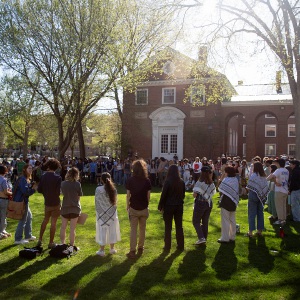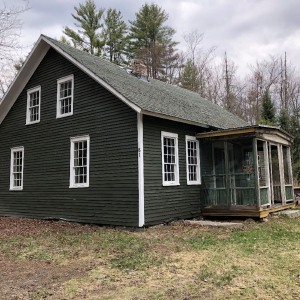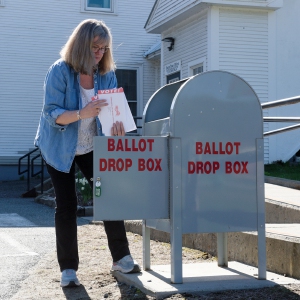Column: Assault on public education shifts to the states
| Published: 02-08-2021 8:16 AM |
For those of us who care passionately about public schools, the departure of Betsy DeVos as secretary of education comes as a relief. Unfortunately, due to the Supreme Court’s misguided Espinoza v. Montana decision, defenders of public education cannot let down their guard because the battle has shifted to the states.
In Vermont, an appeals court ruling last month held that the state cannot exclude students from using school vouchers for parochial or religious schools. The state’s voucher system was designed to allow students in underserved districts to attend public schools in a neighboring district. Drawing on the Espinoza decision, however, which held that if a state issues vouchers it cannot deny their use for religious schools, the court has ruled that the vouchers can be so used.
Vermont is also facing two lawsuits brought by national conservative legal groups that are challenging the exclusion of religious schools from the state’s tuition program.
Similarly, in New Hampshire, a Croydon couple filed a lawsuit in September arguing that religious schools should be included in the state’s tuition program, in which towns without schools pay for their students to attend nearby public or private schools, provided they are non-religious.
In addition, the Republican-controlled Legislature has taken up a bill, HB 20, which would set up “education freedom accounts.” Under this program, the state would transfer into each eligible student’s account the per pupil “adequate education” grant amount that would have been provided to the student’s public school. The student’s parents could then use that money to pay for private or religious school tuition, fees and a wide range of other expenses.
The state of Iowa is another battleground. Kim Reynolds, the Republican governor, recently unveiled a proposal that, under the banner of “school choice,” would allow students to use vouchers to attend private schools.
The Reynolds proposal has a good chance of passing the Legislature because both houses are dominated by Republicans.
As an alumnus of public schools in Iowa, Minnesota and Michigan, I mourn these developments. Public education is one of our nation’s best ideas, and the persistent attempts on the part of politicians to undermine it with the misleading rhetoric of “choice” represents a real threat to the future of democracy.
Article continues after...
Yesterday's Most Read Articles
 Dartmouth administration faces fierce criticism over protest arrests
Dartmouth administration faces fierce criticism over protest arrests
 Hanover house added to New Hampshire Register of Historic Places
Hanover house added to New Hampshire Register of Historic Places
 Sharon voters turn back proposal to renovate school
Sharon voters turn back proposal to renovate school
Known as “common schools” in the 19th century, public schools were devised as a way for those on the margins of society to better themselves and become upwardly mobile.
They also became the most logical place, sometimes the only venue, where future generations could coexist with at least a measure of comity and learn the rudiments of democracy.
Public schools have played an important role in American history and culture by providing a common ground for children of different ethnic groups and religious persuasions, regardless of social class, a place where differences could be explored and friendships formed. At school — in the classroom or on the playground — children interacted with one another and learned to understand one another.
Public schools have sometimes fallen short of those ideals; I don’t deny that. But whatever common culture we have attained in this country has come largely through the agency of public education.
The private, religious and specialized schools promoted by the advocates of school vouchers and other schemes threaten that heritage. By siphoning students and funds from the public schools, private education inevitably narrows that meeting ground.
Parents, of course, have every right to educate their children as they please. But not at public expense. And taxpayer funds redirected to parochial or religious schools represents a clear violation of the First Amendment, which prohibits “the establishment of religion.”
While the Supreme Court’s Espinoza ruling prohibits states from denying funds based on the recipient’s religious status, states may yet retain the authority to regulate how those taxpayer funds are used. Even so, the ruling opens the door to mischief.
If public education is one of America’s best ideas, the separation of church and state may be the very best. The First Amendment, properly understood, simultaneously shields the common good from the disruptions of religious factionalism while it protects the integrity of faith from too close an association with the state.
Public schools, free from sectarian influence, have been an essential cog in American democracy, providing students with basic education in civics together with real-world interactions with those beyond their own ethnic, religious and socioeconomic worlds.
That is not to say that addressing the needs of public education is easy. We live in a society that does not value its teachers. Teachers and administrators face stubborn bureaucracies, perpetual funding battles and, at times, unreasonable unions. Some of the most talented teachers finally give up and pursue other, more lucrative careers.
In this context, diverting money into private schools sounds like a quick fix. It sidesteps the hard work and the investments required to reclaim the noble legacy of public education in America. But these schemes are myopic and chimerical, especially at a time when we face the challenges of pluralism as never before.
I wish I could say that this is not a partisan issue, but I fear it is. The secretary of education for the previous administration devoted her life to the destruction of public schools and relentlessly pursued the evisceration of public education. For decades, Republican-controlled legislatures across the country have deprived schools and their teachers of the resources they need to succeed, often under the pretext of tax cuts that were typically targeted toward the affluent.
Then, after years of starving those schools, these same cynical politicians circle back like vultures to declare public education a failure and propose remedies that would finish off the destruction of one of America’s best ideas.
The fight for public education, moving now to the states, is far from over.
Randall Balmer is the John Phillips Professor in Religion at Dartmouth College. His latest book is Solemn Reverence: The Separation of Church and State in American Life (Steerforth Press).

 Editorial: Response to campus protests only adds fuel to the fire
Editorial: Response to campus protests only adds fuel to the fire Editorial: Chris Sununu’s moral vacuum
Editorial: Chris Sununu’s moral vacuum Editorial: Gambling tarnishes America’s sporting life
Editorial: Gambling tarnishes America’s sporting life By the Way: A white nationalist’s many mistruths
By the Way: A white nationalist’s many mistruths
